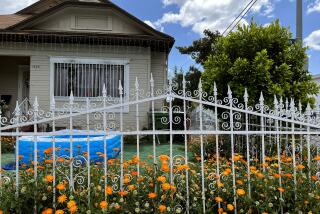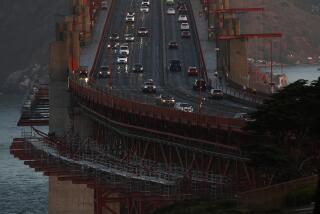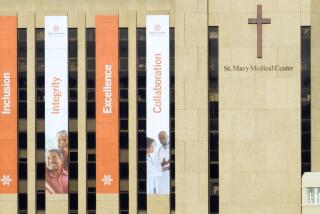Delta Leads the Pack in Security : Burbank Firm Makes Barricades, Parking Lot Spikes
- Share via
You see them all over the place. Signs threaten ominously, “Warning! Severe Tire Damage,” and, sure enough, a row of spikes looms in the pavement ahead.
In the parking business, those spikes are called saber teeth. Among people in the industry, Delta Scientific of Burbank is known as their leading producer, with 90% to 95% of the market in the tire-puncturing devices.
But as ubiquitous as these saber teeth are in America’s parking lots, they’re not enough of a business to keep Delta growing the way it wants. So the company has started emphasizing another kind of barrier, one that is popping up at embassies, military bases and corporate facilities around the world.
Thwarting Terrorists
This one is intended to keep out terrorist car bombers. Designed as a second line of defense behind the gates of guard posts, it is a retractable, wedge-shaped barricade, a cage covered by a steel skin.
When the gate is open, the new barricade lies flush with the street to let cars and trucks in and out. But when the gate is closed, the barricade rises--looking something like a giant piece of pie lying on its side--to pose a formidable obstacle.
Delta, which began making the barricades in 1977, has cornered that market, too, and is profiting from the widespread security concerns spawned over the past two years, in part by the series of car and truck bombings at U. S. facilities in Lebanon.
The company’s president, Harry D. Dickinson, 59, says Delta has been at the right place at the right time. A former aerospace executive, Dickinson started the business in his family’s Glendale garage in 1974. He owns the business with his wife, Margaret.
Family Business
Their son, David, 32, is in the business, too. As a vice president with Delta, he handles marketing in South America and most of Asia while his father takes Europe, Africa and the Middle East.
Despite the way it has gobbled up the saber-teeth business, Delta’s barricades--known as Counter Terrorist Vehicle Barricade Systems--accounted for 75% of Delta’s $8.5 million in sales during its fiscal year ended June 30, Dickinson said. The company says that its sales have grown an average of 50% a year since it opened and that it always has been profitable.
Few Qualified Firms
According to the State Department, which has 230 of the barricades at its embassies and offices around the world, only three companies are qualified to make the units to government standards: Delta, Western Manufacturing of Bottineau, N. D., and Baltimore-based Nasatka & Sons.
“Delta’s got a rapport with the government that’s the envy of the rest of us,” said James Page, president of Western Manufacturing, which makes a ribbed barrier it calls Portapungi. Page claims 30% of the market and says Delta has most of the rest.
Dickinson, who grew up in Hollywood and later studied electrical engineering at USC, spent 20 years marketing aerospace equipment for various companies before getting fed up with big-company ways.
His last position before starting Delta was as vice president for marketing with Houston Fearless, a maker of aerial reconnaissance equipment.
Originally, Delta made water-purification systems. But when Dickinson’s steel parts supplier, Buildesign, went out of business months after Delta got started, the fledgling company bought the business and inherited its clients for parking gates.
Strengthened Spikes
Dickinson pursued the saber-teeth business, strengthening, he said, what was then the industry standard of weak spikes that tended to break or bend.
Delta developed spikes of 3/8-inch steel that punch gaping holes in tires that run over them, and, by 1979, the company was in the parking-equipment business exclusively.
Delta also makes a device, called a loop detector, that electronically senses when a car is at a parking lot ticket dispenser. When a car pulls up, it sends a signal to the dispenser to issue a ticket.
“Their stuff is among the best in the business,” said Mike Murray, operations manager for Van Nuys-based Parking Facilities Equipment Corp., which installed parking equipment at Los Angeles International Airport, including Delta’s electronic saber-teeth devices used in rental-car lots to prevent thefts. “They’re big.”
A surge in terrorism spurred Delta’s barricades business. In 1985, there were 1,527 bombings worldwide, up 37% from 1982, according to Risks International, the Arlington, Va., terrorist-watch group.
Pioneers in Field
But Delta became the biggest in the barricade business by getting there first. Tests of Delta equipment in 1982 at Sandia National Laboratories in New Mexico set the standard for the industry.
Page of Western Manufacturing grouses about the advantage Delta had. “We have to meet specs that they set,” he said. “The State Department probably thinks the technology is higher than it is. But there’s nothing to making them.”
Western Manufacturing says its units are much less expensive than Delta’s, but Delta says the products aren’t comparable. Western Manufacturing’s units sell for $4,000 to $12,000 each. Dickinson says his units cost from $20,000 to $40,000, “depending on how many bells and whistles you want.”
International Market
But Delta outsells Western Manufacturing anyway. The company has placed its barricades for the State Department in places ranging from Montevideo to Munich, Algiers to Buenos Aires, Riyadh to Rome.
Frank Matthews, a State Department spokesman, credited the barriers with helping to foil an attempted bombing in Lisbon in February, although accounts of the incident vary.
Delta also has private clients, including Westinghouse Electric, which uses the units at its nuclear fuel processing plant in Idaho Falls. A nuclear power plant in South Africa also has Delta barricades.
To reach such far-flung markets, Delta maintains full-time sales representatives in London, Rome, Frankfurt and Washington. The company employs 53 at its two manufacturing plants in Burbank, a metal-working operation and a place where products are finished and put into crates.
More to Read
Inside the business of entertainment
The Wide Shot brings you news, analysis and insights on everything from streaming wars to production — and what it all means for the future.
You may occasionally receive promotional content from the Los Angeles Times.










